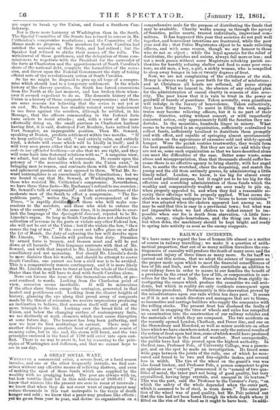A GREAT SOCIAL WANT.
WIIENEVER a commercial crisis, a severe frost, or a hard season invades, and one or the other frequently intrude, we find our- selves without any effective means of relieving distress, and even of making the most of those funds which are supplied by the wealthy with no grudging *hand. The poor are always with us, but how terrible their lot in this mid-winter of 1860-61 ! We know that winters like the present are sure to recur at intervals ; we know that when they do not occur want of employment may reduce thousands in this vast metropolis to the verge of death hunger and cold ; we know that a-panic may produce like effects ; yeptie go on from year to year, and devise no organization on a. comprehensive scale for the purpose of distributing the funds that may be available. Charity works among us through the agency of Societies, police courts, trusted individuals, improvised com- mittees. It has happened this year that societies do not pull well together, and benevolent intentions are frustrated, while the poor pine and die ; that Police Magistrates object to be made relieving officers, and with some reason, though we say honour to those who do not so object ; while the legal agencies for the relief of destitution, the parishes and unions, always fail more or less; and not a week passes without some Magistrate rebuking parish au- thorities for harshly refusing shelter and food to some poor crea- ture, an old mat, a boy, a girl, a sickly woman, who is compelled to sleep away hunger in ten or twenty degrees of frost.
Now, we are not complaining of the selfishness of the rich. Money is always ready to pour forth for the relief of misfortune ; and at Christmas all hearts are softened, all purse strings loosened. What we lament is, the absence of any enlarged plan for the administration of casual charity in seasons of dire seve- rity. The poor know that it is vain to trust in the power or goodwill of boards of guardians. Taken severally, even guardians will indulge in the luxury of benevolence. Taken collectively, they have flinty hearts. To assist in filling the void, magis- trates may become relieving officers, but it is no part of their duty. Societies, acting without concert, or with imperfectly „concerted action, only approximately fulfil the function they un- dertake. In the meantime, hundreds linger in misery. What seems to be required is an organization, sufficiently centralized to collect funds, sufficiently localized to distribute them promptly and with effect, and capable of springing almost spontaneously into action on the appearance of excessive cold and widely-spread hunger. Were the parish vestries trustworthy, they would form the best possible machinery. But they are not so and while they are not so, some such organization as that we have described alone can meet the difficulties of the case. Better some waste, some abuse and misappropriation, than that thousands should suffer be- cause there is no effective agency to bring charity, with her angel face, to soothe the wretched, cheer the despairing, and snatch the young and the old from untimely graves, by administering a little timely relief. London, we know, is too big for almost every social and political purpose, but it ought not to be too big for the effective and searching administration of those funds which the wealthy and comparatively wealthy are ever ready to pile up, when properly appealed to, and when they feel a reasonable se- curity their offerings will be properly applied. What seems de- sirable is something analogous to the "house to house visitation" that was adopted when the cholera appeared last among us. It may be said that this is easy in a provincial town; but what was not impossible when we had cholera to defeat cannot be im-
possible when our foe is death from starvation. little fore- sight, energy, single-heartedness, and the thing can be done ; but when done, the machinery should be kept bright and ready to spring into activity as soon as the enemy reappears.


























 Previous page
Previous page